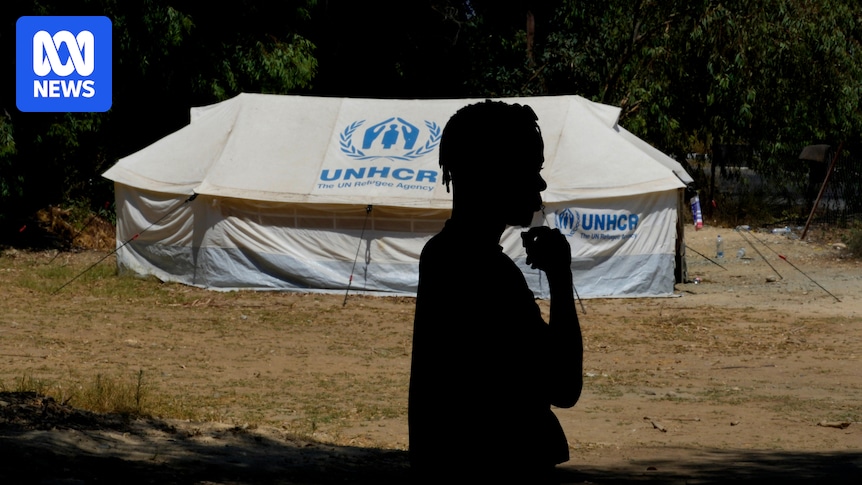The Mediterranean island nation of Cyprus has been urged to allow nearly three dozen asylum seekers out of a United Nations-controlled buffer zone, where they have been stranded in tents for months.
Around 35 people, including young children, continue to face “poor living conditions” according to a senior official with Europe’s top human rights watchdog.
Here is what we know about these asylum seekers stuck in limbo.
What is the buffer zone?
Cyprus has been divided into a Turkish-occupied north and UN-recognised Cypriot south since Turkiye troops invaded the country in 1974.
Only Turkiye recognises northern Cyprus, where it has a force of more than 35,000 troops.
Cyrus joined the European Union in 2004, but only the south is internationally recognised and has full membership benefits.
This includes having the authority to extend asylum or international protection to migrants.
The 180 kilometre-long buffer zone separates the breakaway north of the island nation with the south where the internationally recognised government is seated.
Why are asylum seekers going to Cyprus?
Cyprus has seen a major increase in asylum seeks arriving to the north in recent years.
The migrants come from countries including Syria, Iran, Sudan, Afghanistan and Cameroon.
Many are arriving from Turkiye to northern Cyprus, crossing the buffer zone and entering the south.
The island also experienced a significant influx of Syrian refugees at the start of the year, who travelled by boat from Lebanon to the island.
The island saw an unprecedented influx of hundreds of refugees arriving by boat from Syria in early 2024. (Reuters: Yiannis Kourtoglou)
Cyprus authorities have previously said its proximity to the Middle East has made it a prime destination, with war-torn Syria over the past decade contributing to the number of Syrians heading to the island.
Escalating tensions in the Middle East have also contributed to asylum seekers moving through the island nation, according to a recent migration report.
But Cypriot authorities have enacted a series of stringent measures along the buffer zone in recent months, including the installation of cameras and special police patrols.
Migrant crossings from the north to the south have steeply dropped in recent months as a result.
Cypriot authorities have consistently said they would not allow the buffer zone to become a gateway for an illegal migration influx, arguing it would put “severe strain” on the island’s asylum system.
Earlier this year, Cyprus suspended the processing of asylum applications from Syrian nationals after granting international protection to 14,000 Syrians in the last decade.
Why is Cyprus being urged to allow asylum seekers?
The living conditions at the camps inside the buffer zone have been spotlighted by the Council of Europe’s Commissioner for Human Rights Michael O’Flaherty in a letter released on Wednesday.
Commissioner O’Flaherty said while food and drinking water are being provided by the Cypriot authorities, there has been reported difficulties in getting items such as formula milk and diapers for babies.
The asylum seekers living in the buffer zone come from countries including Syria, Iran, Sudan, Afghanistan and Cameroon.
(AP Photo: Petros Karadjias)
He said the prolonged stay in such conditions is likely to affect their mental and physical health, as illustrated by the suicide attempts of two women.
Commissioner O’Flaherty acknowledged the “seriousness and complexity” of Cypriot authorities’ efforts to stem the flow of migrants crossing the buffer zone from north to south to seek asylum.
However, he added this does not mean authorities can ignore their obligations under international law to offer migrants “effective access to asylum procedures and to adequate reception conditions”.
His letter comes a couple of months after the UN refugee agency also urged the government to let the migrants seek asylum.
How has the Cyprus government responded to the letter?
In a reply letter, Cypriot President Nikos Christodoulides said authorities are obligated to crack down on people-smuggling networks moving people from Turkiye to northern Cyprus and then to the south.
The Cypriot president said authorities will “make every effort” in accordance with international law “to prevent the normalisation of irregular crossings” through the buffer zone.
President Christodoulides says the government is offering supplies to the stranded asylum seekers. (Reuters: Urs Flueeler/Pool)
The president also defended using marine police vessels to patrol international waters to prevent migrants reaching the island by sea and said those patrols were in compliance with international law.
President Christodoulides said the government is offering supplies and healthcare to the stranded asylum seekers.
He assured Commissioner O’Flaherty that the matter will be resolved within the next few weeks and did not elaborate further.
AP
